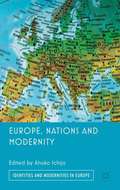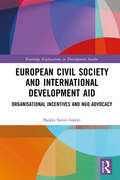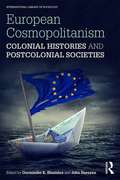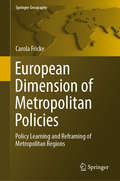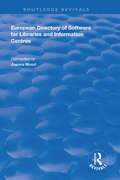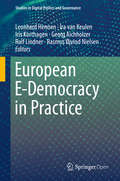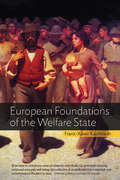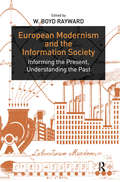- Table View
- List View
Europe, Nations and Modernity
by Atsuko IchijoThis work offers a fresh perspective to the study of 'Europe' by placing the discussion of 'What is Europe?' and 'What is it to be European?', in a wider context of the study of modernity through a collection of nine case studies.
European Cities, Municipal Organizations and Diversity
by Maria SchillerThis book challengesthe prevailing view that local authorities are irrelevant in immigrationpolicy-making. Presenting an in-depth ethnographic study of the recentimplementation of local 'diversity policies' in the Netherlands, Belgium andUnited Kingdom, it identifies a new politics of difference, characterized by a'paradigmatic pragmatism'. Building on extensive fieldwork in Amsterdam,Antwerp and Leeds, the author shows that, rather than simply replacing anearlier politics of difference, local diversity policies combine ideals ofmulticulturalism, assimilation and diversity. She links these findings to theongoing modernization and diversification of municipal authorities, and theimpact of this transformation on the profile of the bureaucrats and theirimplementation of diversity policies. This thought-provoking work will appealto students, researchers and practitioners engaged in the fields ofimmigration, diversity and multiculturalism.
European Citizenship and Social Integration in the European Union (Routledge Advances in Sociology)
by Jürgen Gerhards Holger LengfeldSince 2008, the European Union has been affected by one of the most severe crises in the history of Europe. This book builds on the work of Jürgen Habermas to answer the key question: is Europe strong enough to overcome the recent crisis? Arguing that recovery can only take place if the citizens of Europe regard themselves as members of a socially integrated European society, this volume sets out three conditions for successful European social integration: <P><P> European citizens mutually respect each other as equals, accepting that all EU citizens should have equal economic, political and social rights. Those citizens objecting to the idea of European equality should not constitute a minority with potential for mobilisation that could impede the ongoing process of European social integration. Europeans act upon their equality beliefs in everyday practice – without differentiating between nationals and EU migrants. <P><P> Based on a survey carried out in Germany, Spain, Poland and Turkey, the authors argue that the requirements for a socially integrated Europe are largely in place already. Their findings allow for optimism regarding the future of the EU, as the cultural foundations for a democratisation of Europe are laid. This volume develops a theoretical framework of a socially integrated European community, and will be useful for students and scholars of sociology, citizenship studies, social policy, political science and European studies.
European Civil Service in (Times of) Crisis
by Didier GeorgakakisThis book, part of the new wave of political sociology in EU studies, examines the dialectics of construction/deconstruction of the European civil service through a succession of empirically grounded case studies. Breaking with the usual representations of 'Eurocrats', it sheds light on a hidden aspect of the current European crisis: a crisis of social reproduction which affects the European civil service in a heavy context of management reforms, enlargements, institutional changes and the euro crisis. This in turn has a number of consequences in terms of internal tensions, power, and more broadly, the capacity of EU institutions to create convergence between diverging national and economic interests, and to embody a European future. European Civil Service in (Times of) Crisis will be of interest to students and scholars across a wide range of disciplines, including politics, sociology and public administration, to practitioners working in and with the EU institutions, as well as those wishing to know more about the EU.
European Civil Society and International Development Aid: Organisational Incentives and NGO Advocacy (Routledge Explorations in Development Studies)
by Balázs Szent-IványiThis book explains how and why European non-governmental development organisations (NGDOs) engage in advocacy towards the European Union (EU). It analyses the heterogenous structure of the sector, with examples ranging from large multinational networks to essentially single person NGDOs. The book provides a detailed map of the topics which have featured in NGDO advocacy since 2006, arguing that NGDOs have generally been reactive in their advocacy towards the EU. The author explains how they have contested a number of policy issues on the agendas of the EU institutions, especially around the diversion of aid to manage migration and leverage private sector investments. Furthermore, some NGDOs have used the COVID-19 pandemic as an opportunity to re-package their pre-existing policy demands. Based on an analytical framework focused around three variables, namely moral vision, funding concerns, and the need to build/maintain a ‘good’ reputation, the book explains these advocacy choices, and argues that much of NGDO advocacy seems to be consistent with funding motivations. The author highlights the importance of moral vision and reputational concerns in moderating how far NGDOs will go with funding-driven advocacy, arguing that motivations need to be looked at in their complexity, and within the specific policy context. Drawing on a range of quantitative and qualitative data sets to provide a rich and varied picture of the advocacy work of European development NGOs, European Civil Society and International Development Aid is a key reference for researchers and practitioners working in the field.
European Cohesion Policy: The Theory And Practice Of European Policy Making (Regions and Cities)
by Willem MolleThe only comprehensive text available for advanced study and professional reference, this book brings much needed clarity to both the theoretical and practical aspects of EU intervention. Integrating both theoretical and practical research in a clear and accessible structure, covering economic, social and territorial issues European Cohesion Policy provides a systematic view of the various stages of the whole policy cycle, looking in detail at: the evolution of the problems the design of the policy system the implementation in practice the evaluation of effects . An authoritative analysis of the problems and debates involved, European Cohesion Policy is essential reading for students, policy makers, development workers and researchers working in all aspects of European policy.
European Cosmopolitanism in Question
by Roland Robertson Anne Sophie KrossaIncluding a stellar line-up of international scholars, this book is an ambitious analysis of cosmopolitanism that will push the debate into new arenas, open up new lines of inquiry and have an impact on the study of globalization and global processes for years to come.
European Cosmopolitanism: Colonial Histories and Postcolonial Societies (International Library of Sociology)
by Gurminder K. Bhambra John NarayanThis book provides a fresh examination of the cosmopolitan project of post-war Europe from a variety of perspectives. It explores the ways in which European cosmopolitanism can be theorized differently if we take into account histories which have rarely been at the forefront of such understandings. It also uses neglected historical resources to draw out new and unexpected entanglements and connections between understandings of European cosmopolitanism both in Europe and elsewhere. The final part of the book places European cosmopolitanism in tension with contemporary postcolonial configurations around diaspora, migration, and austerity. Overall, it seeks to draw attention to the ways in which Europe’s posited others have always been very much a part of Europe’s colonial histories and its postcolonial present.
European Data Protection: Coming of Age
by Paul De Hert Yves Poullet Serge Gutwirth Ronald LeenesOn 25 January 2012, the European Commission presented its long awaited new "Data protection package". With this proposal for a drastic revision of the data protection framework in Europe, it is fair to say that we are witnessing a rebirth of European data protection, and perhaps, its passage from an impulsive youth to a more mature state. Technology advances rapidly and mobile devices are significantly changing the landscape. Increasingly, we carry powerful, connected, devices, whose location and activities can be monitored by various stakeholders. Very powerful social network sites emerged in the first half of last decade, processing personal data of many millions of users. Updating the regulatory network was imminent and the presentation of the new package will initiate a period of intense debate in which the proposals will be thoroughly commented upon and criticized, and numerous amendments will undoubtedly be proposed. This volume brings together some 19 chapters offering conceptual analyses, highlighting issues, proposing solutions, and discussing practices regarding privacy and data protection. In the first part of the book, conceptual analyses of concepts such as privacy and anonymity are provided. The second section focuses on the contrasted positions of digital natives and ageing users in the information society. The third section provides four chapters on privacy by design, including discussions on roadmapping and concrete techniques. The fourth section is devoted to surveillance and profiling, with illustrations from the domain of smart metering, self-surveillance and the benefits and risks of profiling. The book concludes with case studies pertaining to communicating privacy in organisations, the fate of a data protection supervisor in one of the EU member states and data protection in social network sites and online media. This volume brings together some 19 chapters offering conceptual analyses, highlighting issues, proposing solutions, and discussing practices regarding privacy and data protection. In the first part of the book, conceptual analyses of concepts such as privacy and anonymity are provided. The second section focuses on the contrasted positions of digital natives and ageing users in the information society. The third section provides four chapters on privacy by design, including discussions on roadmapping and concrete techniques. The fourth section is devoted to surveillance and profiling, with illustrations from the domain of smart metering, self-surveillance and the benefits and risks of profiling. The book concludes with case studies pertaining to communicating privacy in organisations, the fate of a data protection supervisor in one of the EU member states and data protection in social network sites and online media.
European Democracies Against Terrorism: Governmental Policies and Intergovernmental (Routledge Revivals)
by Fernando ReinaresThis title was first published in 2000. In this multidisciplinary volume, contributors critically assess the different measures designed and implemented by western European democratic governments since the late 1960s in order to counter the challenge of terrorism. The work also analyzes the problems and perspectives surrounding intergovernmental co-operation against such evolving phenomenon, as developed within the framework of the European Union.
European Developments in Corporate Criminal Liability (Routledge Advances in Criminology)
by James Gobert Ana-Maria PascalWhen corporations carry on their business in a grossly negligent manner, or take a cavalier approach to risk management, the consequences can be catastrophic. The harm may be financial, as occurred when such well-regarded companies as Enron, Lehman Brothers, Worldcom and Barings collapsed, or it may be environmental, as illustrated most recently by the Gulf oil spill. Sometimes deaths and serious injuries on a mass scale occur, as in the Bhopal gas disaster, the Chernobyl nuclear explosion, the Paris crash of the Concorde, the capsize of the Herald of Free Enterprise, and rail crashes at Southall, Paddington and Hatfield in England.What role can the law play in preventing such debacles and in punishing the corporate offenders? This collection of thematic papers and European country reports addresses these questions at both a theoretical and empirical level. The thematic papers analyse corporate criminal liability from a range of academic disciplines, including law, sociology/criminology, economics, philosophy and environmental studies, whilst the country reports look at the laws of corporate crime throughout Europe, highlighting both common features and irreconcilable differences between the various jurisdictions.
European Dimension of Metropolitan Policies: Policy Learning and Reframing of Metropolitan Regions (Springer Geography)
by Carola FrickeThis book questions how policies for the metropolis become Europeanised. The book analyses how spatial concepts and political ideas permeate the European multi-level system. Through an interpretive comparison of five contexts, the book provides an overview of the European orientation tracing two interdependent developments. First, the book examines references to ‘Europe’ in national and subnational policies. In French and German policies, metropolitan regions are increasingly framed as being central not only for inter-municipal coordination, but also as nodes within the European space. Moreover, Europeanised metropolitan regions such as Lyon and Stuttgart develop European strategies. The second development shows how metropolitan regions appear as actors and issues in the European policy arena, contributing to a tentative and implicit metropolitan dimension. This multi-scalar analysis is of interest for scholars and practitioners specialised in metropolitan regions, European urban and regional policies, geography and related areas.
European Directory of Software for Libraries and Information Centres (Routledge Revivals)
by Joanna WoodFirst Published in 1993 A Directory of Library and Information Software for Microcomputers has been published in four highly successful editions. The growth of interest in and proliferation of software packages in Europe has caused this new edition of the Dictionary to concentrate on the software that is both actively marketed in Europe and that has good back up support. The coverage is restricted to microcomputer software that is running under MS DOS/PC DOS, OS/2, UNIX, PICK and APPLE MACINTOSH operating systems. All software suitable for use in library and information work will be included, but not industry-standard word processing spreadsheets, accounts or other office administration systems. Coverage of Europe includes the 12 EC countries together in Sweden, Norway, Finland, Switzerland and Austria. More than 278 packages are listed originating from 299 suppliers. The European Directory is arranged in a straight alphabetical sequence by software name, indexed by country, by operating system and by supplier.
European Disability Pension Policies: 11 Country Trends 1970–2002 (Public Policy And Social Welfare Ser.)
by Christopher PrinzThis title was first published in 2003. During the last twenty years, the longer-term sustainability of social insurance systems has become a major issue in all European countries. Analysts and governments are increasingly alarmed at the growth in the number of disability benefit recipients, and the expansion of disability benefit schemes via increasing benefits, broadening coverage and easing access. While policy measures differ widely, policy goals tend to converge. This book analyses and compares the often controversial disability benefit policies in eleven European countries, examining their rationale, impact and outcome, and the direction of reform in the future. It will make fundamental reading for specialists in disability, social protection and public economics, and for Social Policy academics, researchers and students generally.
European Dispute over the Concept of Man: A Study in Political Anthropology (Contributions to Political Science)
by Michał GieryczThe book represents original research in a field of study rarely pursued while analysing the intellectual dimensions of disputes over ethically sensitive issues that occur in European Union politics. These disputes are generally analysed at ideological, ethical, economic and interstate levels. However, these references do not suffice in understanding the issue, which is related to a divergent perception of the essence of humanity and thus the subject matter of anthropology. The main research objective of the monograph is therefore to reconstruct the sources and the specific European Union way of thinking about the human being. Methodologically, the book expands the understanding of political anthropology within political science and presents a range of suitable instruments for pursuing anthropological research. At the theoretical level, it proposes an anthropological typology of the main currents of European political thought and reveals their prominence for the anthropological orientation of the EU's axiology. Empirically, it provides an analysis of the anthropological features of European Union institutions and policies in addition to discussing the relation between the axiological and anthropological positions of the main political and national groups within the EU.
European E-Democracy in Practice (Studies in Digital Politics and Governance)
by Ralf Lindner Georg Aichholzer Leonhard Hennen Ira Van Keulen Rasmus Øjvind Nielsen Iris KorthagenThis open access book explores how digital tools and social media technologies can contribute to better participation and involvement of EU citizens in European politics. By analyzing selected representative e-participation projects at the local, national and European governmental levels, it identifies the preconditions, best practices and shortcomings of e-participation practices in connection with EU decision-making procedures and institutions. The book features case studies on parliamentary monitoring, e-voting practices, and e-publics, and offers recommendations for improving the integration of e-democracy in European politics and governance. Accordingly, it will appeal to scholars as well as practitioners interested in identifying suitable e-participation tools for European institutions and thus helps to reduce the EU’s current democratic deficit. This book is a continuation of the book “Electronic Democracy in Europe” published by Springer.
European Foundations Of The Welfare State
by Franz-Xaver KaufmannWhile social welfare programs, often inspired by international organizations, are spreading throughout the world, the more far-reaching notion of governmental responsibility for the basic well-being of all members of a political society is not, although it remains a feature of Europe and the former British Commonwealth. The welfare state in the European sense is not simply an administrative arrangement of various measures of social protection but a political project embedded in distinct cultural traditions. Offering the first accessible account in English of the historical development of the European idea of the welfare state, this book reviews the intellectual foundations which underpinned the road towards the European welfare state, formulates some basic concepts for its understanding, and highlights the differences in the underlying structural and philosophical conditions between continental Europe and the English-speaking world.
European Glocalization in Global Context (Europe In A Global Context)
by Roland RobertsonThis book consists of a collection of essays that deal with glocalization in Europe, including the idea of Europeanization as glocalization. The contributors deal with a range of topics including migration, media, football, beauty, Christianity, democracy and the European Union.
European Glocalization in Global Context (Europe in a Global Context)
by Roland RobertsonThis book consists of a collection of essays that deal with glocalization in Europe, including the idea of Europeanization as glocalization. The contributors deal with a range of topics including migration, media, football, beauty, Christianity, democracy and the European Union.
European Immigration: A Sourcebook
by Anna TriandafyllidouWho are Europe's immigrants? This innovative volume provides a comprehensive overview of the immigration situation in all 25 EU countries. Each chapter is written by an expert and follows a common structure, allowing direct comparisons to be made between countries. Chapters provide a clear focus in terms of the methods used, data collected, literature reviewed and research questions addressed, and draw on hard-to-obtain material, including sources not previously published in English. Each chapter concludes with a critical assessment of the present migration situation of the country in question and its future prospects. Substantive introductory and concluding chapters offer a general overview of immigration in Europe, which complements and contextualizes the analytical and comparative insights of the individual countries. The first reference volume to provide comprehensive coverage of the EU, European Immigration will be essential for library collections and for scholars and policy-makers in the field.
European Integration as an Elite Process: The Failure of a Dream? (Routledge Advances in Sociology #Vol. 40)
by Max HallerMax Haller's impressive book presents an analysis of the process of European integration which keeps the relation between elites and citizens at the forefront. It is shown on the basis of new empirical data (surveys, interviews, analyses of documents and biographies) that European integration has been led since the beginning by the elites and that today there exists a considerable split between elites and citizens; this split is becoming more profound in the course of time. The book covers the following themes: - the structure, interests and behaviour of the different elites (political, economic, bureaucratic) - the expectations and perceptions of the populations concerning the integration process and the elites - the strategies of the elites to win the consent of the people, in view of widespread scepticism - proposals for reform of the EU, especially with regard to a strengthening of democratic elements which could reduce the split between elites and citizens. A timely and original read, this book will be a useful addition to the library of any political sociologist, political scientist or scholar of European integration.
European Integration, Processes of Change and the National Experience
by Stefanie Börner Monika EigmüllerIn order to better understand processes of European integration, this book offers a new perspective that compares past experiences of change to current transitional moments at the European level. It addresses key questions about European society, EU integration and social change to reveal the social construction of emergent polities and societies.
European Integration, Processes of Change and the National Experience (Palgrave Studies in European Political Sociology)
by Stefanie Börner Monika EigmüllerIn order to better understand processes of European integration, this book offers a new perspective that compares past experiences of change to current transitional moments at the European level. It addresses key questions about European society, EU integration and social change to reveal the social construction of emergent polities and societies.
European Modernism and the Information Society: Informing the Present, Understanding the Past
by W. Boyd RaywardUniting a team of international and interdisciplinary scholars, this volume considers the views of early twentieth-century European thinkers on the creation, dissemination and management of publicly available information. Interdisciplinary in perspective, the volume reflects the nature of the thinkers discussed, including Otto Neurath, Patrick Geddes, the English Fabians, Paul Otlet, Wilhelm Ostwald and H. G. Wells. The work also charts the interest since the latter part of the nineteenth century in finding new ways to think about and to manage the growing body of available information in order to achieve aims such as the advancement of Western civilization, the alleviation of inequalities across classes and countries, and the promotion of peaceful coexistence between nations. In doing so, the contributors provide a novel historical context for assessing widely-held assumptions about today's globalized, 'post modern' information society. This volume will interest all who are curious about the creation of a modern networked information society.
European Money Trails
by Ernesto SavonaEuropean Money Trails examines trends in organized crime across Europe, including money laundering methods and the mechanisms and instruments used to conceal the disposal of the proceeds of crime.By drawing on primary and other authoritative sources, Savona provides a report on national experiences of criminal organization unavailable elsewhere. It will prove especially useful to policymakers and users, as well as scholars looking to understand the criminal dynamics that underlie sophisticated, international offending.
